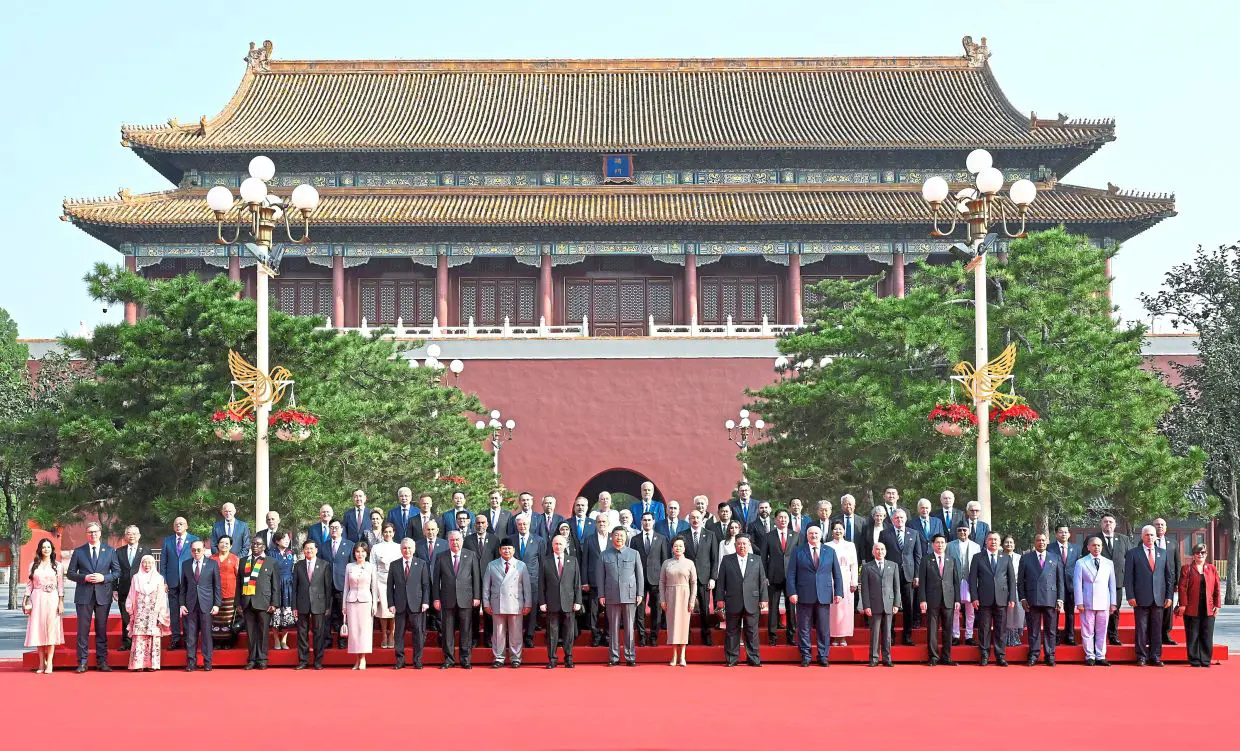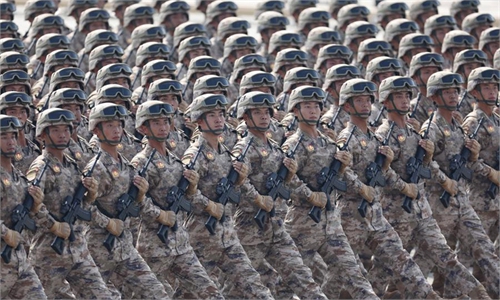Japanese Prime Minister Shinzo Abe delivers a statement in Tokyo on Friday marking the 70th anniversary of the end of World War II. He acknowledged Japan had inflicted "immeasurable damage and suffering" on innocent people but said generations not involved in the conflict should not be burdened with continued apologies. TORU HANAI/REUTERS
BEIJING, Aug. 14 -- As Japanese Prime Minister Shinzo Abe releases an official statement later Friday to mark the 70th anniversary of his country's surrender at the end of World War II (WWII), he is standing at a critical crossroad.
Upon such a highly symbolic and closely watched occasion, Abe has a choice to make, and there is only one way that will lead him and his nation closer to the "normal country" dream he has so frequently shouted from the rooftops.
Choosing a wrong course -- or keeping going astray, given his record on the sensitive history issue -- will undoubtedly carry the second-term prime minister further away from a legacy in nation-building he so desperately needs, as his signature "Abenomics" is losing sizzle.
Any statement that flagrantly flouts the true history and fails to repent Japan's WWII atrocities would be tantamount to Abe dropping a bomb upon his country's international reputation and trustworthiness.
Such an "Abomb" would be particularly sad, as its sole victim would be Japan itself, Abe's motherland, which is the only country in the world that has been A-bombed and still in the healing.
It would also be extraordinarily irresponsible and destructive, not only because its shock waves would blow the chances for his "normal country" ambition to come true anytime soon, but because its fallout would further ail Japan's already morbid ties with its neighbors and stoke regional tensions.
If Abe possesses any reasonable level of sobriety, he will not throw an "Abomb" at his own country. Rather, judging from the trial balloons he has released of late, a more likely scenario is that the canny nationalist would offer an adulterated apology.
An "Abapology" -- mentioning such key words as aggression and apology but placing them in a context that waters down their meaning, or releasing nuanced versions in different languages -- would be regrettable.
Such a half-hearted apology would once again reveal Abe's deep reluctance to face up to his country's wartime crimes and take on the noble responsibility on his shoulders in seriously reflecting on the past in order to usher Japan into a world-assuring future.
A muddle-through approach of that kind would be not only unworthy of the great significance of the historic juncture, but indicative of a conspicuous lack of political and historical calcium, which explains to a large extent why Japan remains an "abnormal" country 70 years after WWII.
The only right way forward is for Abe to stop his rightist slide and provide a proper and unalloyed apology -- explicit enough to demonstrate heartfelt remorse and a resolve to abandon his erstwhile troublesome attitude toward WWII history and help dispel the specter of distrust between his country and its neighbors.
Yet should history be any guide, even an apparently whole-hearted apology from Abe would not be enough. It is the least he should do. To realize his "normal country" dream and restore Japan's standing on the world stage, he has to follow up with concrete actions.
By Deng Yushan (Xinhua)
 Crafty rhetoric, insincere politics
(
Crafty rhetoric, insincere politics
(China Daily)
A very cleverly worded speech. An impressive play of the words. That's about everything we could say about Japanese Prime Minister Shinzo Abe's latest statement on his country's unseemly record in World War II.
Abe didn't seem to deviate much from the well-received benchmark statement in 1995 by then Japanese prime minister Tomiichi Murayama. And the key points of that historic speech, including "aggression", "colonial rule", "remorse" and "apology", did find their way into his speech, though with abundant ambiguity.
For many in his audience, his expression of "heartfelt gratitude" to those who have been tolerant of his country and helped it return to the international community might be an unexpected bonus - not unlike his pledge to "squarely face the history of the past". That could be why some believe Abe has delivered more than what had been anticipated, given the discrepancies among its versions in different languages.
That East Asia just got around a potentially explosive occasion that could have escalated tensions is itself something to celebrate. For Japan's vigilant neighbors, however, whether or not Abe included the salient points of the Murayama Statement in his speech is not just a touchstone to gauge his attitude toward history, but the bottom line as well. Once that line is crossed, Japan's deteriorating ties with neighboring China and the Republic of Korea will slide past a point of no return, at least during Abe's term in office.
Abe knows what will come next. So, even after provoking neighboring countries no end, he waved olive branches at them requesting meetings at the highest level. He is yet to get one, precisely because of his betrayal of the Murayama Statement's spirit.
By incorporating the key expressions of that milestone statement, Abe may effectively silence some of his critics, whose latest demand was that his statement include the core Murayama expressions.
But make no mistake, he didn't present an apology of his own. He merely stated the obvious truth that earlier Japanese cabinets had expressed "heartfelt" apologies for the atrocities committed by imperial Japan.
It would be naive to think the tensions paralyzing East Asia will thus be gone. That Abe didn't cross the Rubicon, at best, means he was aware of the dire consequences of doing so and avoided it. And, that tremendous public pressure from home and abroad forced him to squeeze those words into his speech doesn't mean he actually meant it.
Rhetoric counts when dealing with Japanese politicians, for whom whether or not the Abe statement includes those key words makes a difference. Japanese politicians' infamous tradition of "slip of the tongue", however, makes it even more important to see how they act.
Abe's track record belies his claims of commitment to peace and good neighborly relations. That Abe and his advisers had reportedly struggled over whether or not to include Murayama's expressions, that the ruling parties had not agreed on the exact use of the expressions in the final transcript until the very last moment, that Abe managed to avoid directly referring to Japan's war as one of aggression and some of the perished Japanese as war criminals, and that his words became evasive when it came to Japan's colonial rule and the "comfort women" issue all betrayed a sense of reluctance.
Needless to say, reading between the lines of the Murayama Statement and Abe's speech even a casual reader can feel the difference in tones. In contrast to Murayama's sincerity, Abe seemed eager to shut out the past, though its sophisticated wording did hit the sentimental sweet spot at some points. But that will not be possible until Abe acts sincerely to achieve real reconciliation.
Therefore, even after weathering an otherwise imminent crisis, East Asia will continue to struggle in the long shadow of history.
Related:
 Japan, the major aggressor in the Asia-Pacific region since the 1930s, on Saturday commemorated the [Read it]
Japan, the major aggressor in the Asia-Pacific region since the 1930s, on Saturday commemorated the [Read it]
Japanese Prime Minister Shinzo Abe delivers a statement in Tokyo on Friday marking the 70th annivers[Read it]
Related post:
The news that the "draft of Abe's statement contains an 'apology'" made the headlines all day on Japanese broadca...

 Many 'firsts' in impressive formations displayed in China's massive V-Day parade
Many 'firsts' in impressive formations displayed in China's massive V-Day parade

 Most of Southeast Asia was occupied during most of World War II by the Japanese. The Japanese captured Southeast Asia very quickly but had not planned very well for occupying it. In many ways the Japanese ruled through violence and repression rather than reasonable and humane governing. Southeast Asians that might have welcomed them as liberators were quickly turned off by Japanese brutality
Most of Southeast Asia was occupied during most of World War II by the Japanese. The Japanese captured Southeast Asia very quickly but had not planned very well for occupying it. In many ways the Japanese ruled through violence and repression rather than reasonable and humane governing. Southeast Asians that might have welcomed them as liberators were quickly turned off by Japanese brutality








